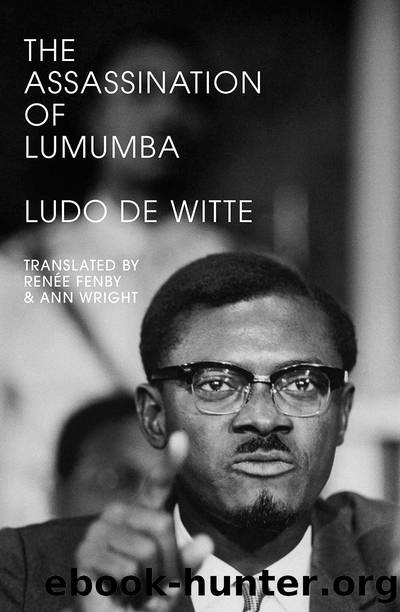The Assassination of Lumumba by Ludo De Witte

Author:Ludo De Witte
Language: eng
Format: epub
Publisher: Verso Books
On the evening of 17 January, after some thought, Vandewalle and company decided not to reprieve Lumumba; thus they gave the green light for his death while hoping that the storm would quickly abate. In the medium term, the death of the nationalist leader could be advantageous. Weber admitted as much to Brassinne in 1987. According to him, the assassination was a matter the âBantus have sorted out between themselvesâ. But Weber ârealised that, for the European advisers, Lumumba was at the centre of the post-independence chaos in the Congo and that his âneutralisationâ would be good for the future.â36
DâAspremont Lyndenâs telegram putting Lumumbaâs fate in Tshombeâs hands limited the political freedom of movement of the Belgo-Katanga lobby. While their subordinates played a crucial role in transferring the prisoners to the Brouwez house, in the assassination, in fabricating their attempted escape, and ultimately in physically getting rid of the bodies, Vandewalle and Clémens, for their part, tried to limit the political fallout. Pierre Adam, a military chaplain, clearly expressed Belgian concerns when, on the evening of 17 January, he sent the following telephone message to Major Weber at the Gendarmerie: âAbove all, no blood on our hands!â37 The chaplain knew how Lumumbaâs detention would end. The soldier-priest simply looked the other way and waited until everything was over. Amen! The senior Belgian officers did not intervene to save the three prisoners.
Is it plausible that during the infamous evening of 17 January, neither Vandewalle, nor Weber, nor Perrad, nor Smal, nor Verdickt, nor Clémens, nor Brassinne, nor Grosjean had any contact with the outside world? This is what the authors of Qui a tué Patrice Lumumba? claim. Although there is no irrefutable proof, this is highly improbable. Did the G2 intelligence officer Verdickt really not contact anybody while he was at the Gendarmerie headquarters writing his Bulletin quotidien de renseignements, which was based on information given him by the police, the Gendarmerie, various informants and Renard, chief of Katangan intelligence, the SCCR? Did Perrad not consult anybody when, after having dinner at his home, he went back to the Gendarmerie headquarters for the three hours from 7 to 10 p.m.? He said he did not remember exactly whom he telephoned on that particular evening. But in a footnote recounting a conversation he had with Perrad, Brassinne reveals that on the evening of 17 January the Major âwas informed of what was afootâ.38
Is it conceivable that the senior Belgian representatives in the entourage of Tshombe and Munongo did not contact Vandewalle, Weber or their colleagues? Vandewalle and his men were not at the Katangan ministersâ meeting which took place at Tshombeâs residence, a few minutes away from the Immokat building (see p. 114â15 below). This was out of character. The regime usually looked to the Belgians to manage things. This was clear at Luano, soon after the prisoners left, when Kibwe said to Vandewalle: âItâs a good thing youâre here!â The Gendarmerieâs âhidden bossâ had indeed taken the initiative on one matter.
Download
This site does not store any files on its server. We only index and link to content provided by other sites. Please contact the content providers to delete copyright contents if any and email us, we'll remove relevant links or contents immediately.
| Central Africa | East Africa |
| North Africa | Southern Africa |
| West Africa | Algeria |
| Egypt | Ethiopia |
| Kenya | Nigeria |
| South Africa | Sudan |
| Zimbabwe |
Goodbye Paradise(2962)
Men at Arms by Terry Pratchett(2404)
Tobruk by Peter Fitzsimons(2060)
Pirate Alley by Terry McKnight(1908)
Arabs by Eugene Rogan(1835)
Borders by unknow(1785)
Belonging by Unknown(1465)
The Biafra Story by Frederick Forsyth(1321)
It's Our Turn to Eat by Michela Wrong(1301)
Botswana--Culture Smart! by Michael Main(1237)
A Winter in Arabia by Freya Stark(1223)
Gandhi by Ramachandra Guha(1196)
Coffee: From Bean to Barista by Robert W. Thurston(1180)
Livingstone by Tim Jeal(1151)
The Falls by Unknown(1141)
The Source by James A. Michener(1133)
The Shield and The Sword by Ernle Bradford(1101)
Egyptian Mythology A Fascinating Guide to Understanding the Gods, Goddesses, Monsters, and Mortals (Greek Mythology - Norse Mythology - Egyptian Mythology) by Matt Clayton(1086)
Africa: Altered States, Ordinary Miracles by Richard Dowden(1078)
